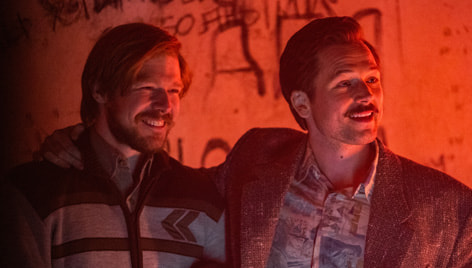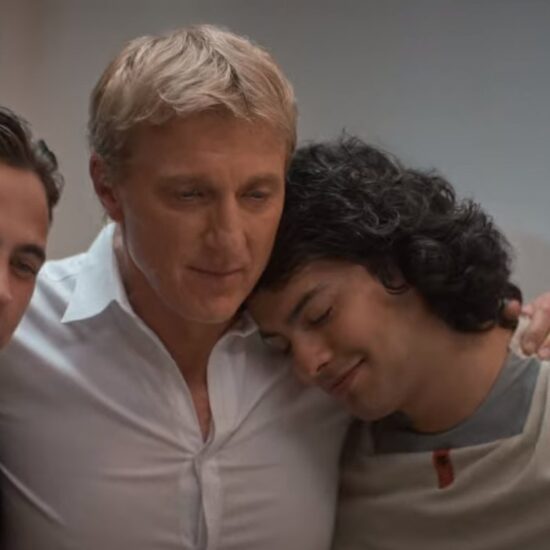
At last, a video game movie that’s more than just a video game movie.
In theory, “Tetris” — that primitive and highly addictive block-stacking strategy game — doesn’t lend itself to the big-screen treatment any more than Rubik’s Cube or Tic-Tac-Toe might. But Noah Pink has found an ingenious solution to a classic puzzle. The screenwriter realized that there’s more to Tetris than most people knew. Namely, there’s a terrific backstory about how this Soviet-hatched computer software made its way over the Iron Curtain, and telling it could play like a Cold War thriller as three teams of Western rivals race one another to Russia to secure the rights.
In a sense, the video game movie that “Tetris” most resembles is 1984’s “Cloak & Dagger,” which made an Atari cartridge the MacGuffin that all kinds of untrustworthy people want to get their hands on. Here, it’s permission to distribute Tetris on international gaming consoles that everyone’s after, and achieving that is doubly challenging since the Russians have their own set of rules. It’s not the game’s creator, Alexey Pajitnov (Nikita Efremov), who gets to decide, but bureaucrats and KGB agents, and some among them see making such a deal as a threat to communism itself.
That detail, plus the fact everything is happening just a few years before the collapse of the Soviet Union, adds an unexpected political dimension to the negotiations, which has special appeal for director Jon S. Baird. Slightly tamer here than in his earlier indie projects (like “Filth”), Baird brings real-world insights and highly original stylistic ideas to the table. For example, he gamely presents new characters and locations using retro-style 8-bit title screens, and later on, during the climactic car chase, the screen pixelates at points, as if we’ve crossed over into an arcade session of Spy Hunter.
For the story to work, we have to care about the characters, so producer Matthew Vaughn (whose flashy fingerprints we can feel all over this film) enlists “Kingsman” star Taron Egerton to play Dutch-Indonesian entrepreneur Henk Rogers, a Japan-based family man who puts his life savings into Tetris. It’s an unconventional and slightly clunky choice to introduce our hero in an investment meeting, but Baird wants us to like the little guy he dubs “Player 1,” and Egerton has the affability to deliver key exposition while trying to convince the bank to back his vision.
From the moment Henk discovers Tetris at a sales conference, he’s smitten, buying a license to release the game in Japan — or so he thinks. Turns out, the contract side of things is a lot more complicated than he (or we) can keep up with, and it may take a business major to untangle all the contract dealings in store. What matters to us is that Henk is up against two more-experienced software competitors: Andromeda owner Robert Stein (Toby Jones), who’s already secured the PC rights to Tetris, and the repugnant father-son combo who run Mirrorsoft, Robert Maxwell (Roger Allam) and his nepotistic No. 2, Kevin (Anthony Boyle).
Henk’s a Boy Scout compared with these cheaters, and though the other players come across a bit too cartoonish at times, it’s a colorful mix of personalities to set against one another. To get the distribution rights to Tetris, all three interested parties must travel to Russia and meet with Belikov (Oleg Shtefanko), the head of the Moscow Computer and Science Center. Henk gets there first, traveling on a tourist visa (it helps that he’s not American) and relying on a local woman named Sasha (Sofia Lebedeva) to serve as translator.
Technically, Henk isn’t allowed to conduct business while visiting Russia, and Belikov further informs him that the license he’s been using to produce Tetris with Nintendo is not legit. Suddenly, the KGB is getting involved, and a high-ranking agent named Valentin Trifonov (Igor Grabuzov) wants a cut, arranging with the Maxwells to sell the rights out from under Henk. The next thing we know, Henk’s in one room trying to woo Alexey while Belikov is playing the other bidders against each other. His intention: to beat the capitalists at their own “game.”
Sure enough, watching these negotiations is a lot more fun than standing over someone’s shoulder as they arrange digital blocks, waiting for a turn. If Henk loses the deal, his savings could be totally wiped out. More than that, if he makes one wrong move, he could wind up in some frozen gulag. “Tetris” shows Henk trying to juggle all these pressures, accelerating as he nears his goal, the way the game does, so you’re really sweating in the final rounds. Picture “Tetris” as a lo-fi version of John Le Carré’s “The Russia House.” Screenwriter Pink is no Tom Stoppard, but he’s plenty clever when it comes to incorporating politics, and by the end, we’re half hoping that Alexey and his family will find a way to defect to the West.
Tapping into late-1980s nostalgia — including the launch of the handheld Game Boy console — the movie doubles as a nifty history lesson, reminding audiences of just how tense things were between the Soviet Union and the rest of the world. At one point, Robert Maxwell appeals directly to his friend Mikhail Gorbachev, while Henk tries to pull the corporate equivalent, ambushing Nintendo president Hiroshi Yamauchi. Who knew that little old Tetris was ever such a big deal?













